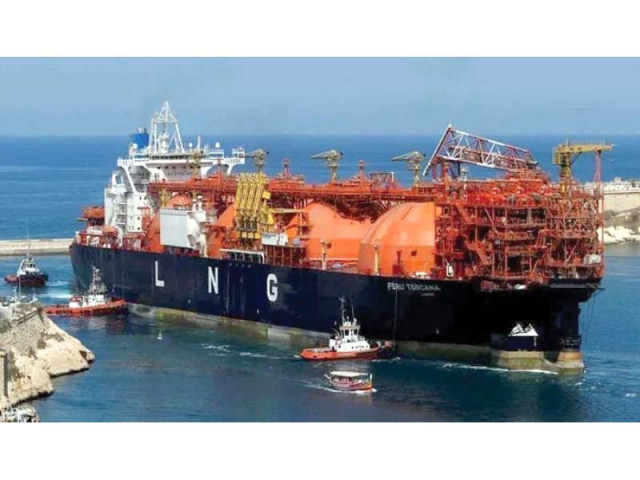Govt mulls selling LNG in spot market
Works on proposal to seek permission from LNG supplier Qatar

Pakistan is working on a proposal to seek the consent of Qatar for selling its liquefied natural gas (LNG) cargoes, being imported under a long-term contract, in the international spot market.
Pakistan has signed an LNG supply contract with Qatar in 2016, as part of which a price revision is due in February 2026. Under the deal, Pakistan State Oil (PSO) is bound to accept LNG shipments even if the country does not have demand for the imported gas.
This arrangement sparks trouble for Sui Northern Gas Pipelines Limited (SNGPL) in transmitting LNG through its pipelines in case the company fails to consume gas.
According to officials, Pakistan has approached Qatar through diplomatic channels, asking it to either cancel shipments or allow their sale in the spot market if there is no consumer demand for LNG.
The National Electric Power Regulatory Authority (Nepra), the power-sector regulator, held a public hearing on Friday to consider an increase in electricity tariffs up to Rs3.41 per unit on account of fuel charges adjustment for May 2024.
It was informed during the hearing that the tariff hike would burden consumers with an additional Rs41 billion in electricity bills for the coming month.
It was pointed out that the actual fuel cost came in at Rs9.12 per unit in May against the reference price of Rs5.7 per unit, showing an increase of Rs3.41 per unit.
During the month, the consumption of electricity dropped 5% due to weather conditions. Officials of the Central Power Purchasing Agency-Guarantee (CPPA-G) told the hearing that total demand had been only 17,000 megawatts during May 2024.
They revealed that more electricity was produced by consuming LNG rather than coal. The cost of LNG-based electricity was calculated at Rs24.7 per unit.
They argued that they had to forecast LNG demand months ago but sometimes “its consumption drops in the electricity sector that increases pressure on the line pack for the public gas utilities”.
Net metering myth
The public hearing was told that the share of net metering in the total energy mix stood at less than 1%.
However, the interveners contended that the Power Division had made it part of propaganda to discourage net metering in the system by saying that its share was less than 1%.
The hearing was informed that those opting for net metering were consuming more electricity from the national grid in night hours. Therefore, “it was just propaganda against net metering”.
NEPRA’s role in electricity prices
The interveners raised questions about the role of the regulator in providing relief to consumers over the past five years.
Nepra also came in for criticism for depriving electricity consumers of the option of paying bills in installments. Nepra did not respond to the queries of the interveners.
CPPA-G officials were questioned about the alleged scam in relation to the Sahiwal coal-fired power plant. Company officials were asked how many cases they had lost in the international court.
Another question was about the mounting circular debt in the power sector. However, the CPPA-G officials refused to respond and asked the interveners to send their questions, arguing that those queries were not relevant to the public hearing.
The regulator had called for producing electricity through coal to overcome load-shedding in May. A Nepra member revealed that the consumers on feeders with less than 10% losses were also facing power outages.
Consumers complained that electricity prices were so high that they had gone beyond their affordability. Nepra reserved its decision, which it would announce after the scrutiny of data.



















COMMENTS
Comments are moderated and generally will be posted if they are on-topic and not abusive.
For more information, please see our Comments FAQ